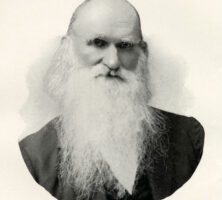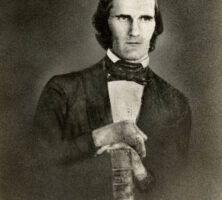Through extraordinary service as chief justice of the Supreme Court of Georgia during the last part of the nineteenth century, Logan Bleckley attained a legendary status not ordinarily bestowed upon members of that tribunal. In addition to being a judge and an attorney, Justice Bleckley also established a reputation for his work in philosophy, poetry, and mathematics.

Courtesy of Hargrett Rare Book and Manuscript Library, University of Georgia Libraries.
Logan Edwin Bleckley was born in Rabun County on July 3, 1827. He was the second son born to Catherine Lutz and James Bleckley, whose service as a clerk of court in Rabun County exposed his son to the law at an early age. Despite having almost no formal education, Bleckley decided at age eleven to study law and began reading statutes in his father’s office. By age eighteen the self-educated Bleckley was admitted to the Georgia bar.
After two years of practice in Rabun County, Bleckley obtained employment in Atlanta as bookkeeper for the state railroad, where he remained for three years. In 1853 he was elected solicitor of the Coweta Judicial Circuit, where he served until 1857.
In 1857 Bleckley married Clara Caroline Haralson, and together they had five children. In 1861 he joined the Confederate military but was discharged because of ill health prior to combat. In 1864 Bleckley was chosen as reporter for the state supreme court, and he served in this role until 1867.
Bleckley accepted an appointment as associate justice of the Supreme Court of Georgia in 1875. There Bleckley displayed a brilliant legal mind and an ability to explain complex legal doctrines in concise and vivid ways. His opinions circulated nationwide because they were often humorous or contained a stanza of Bleckley’s poetry, and he gained a reputation as one of the finest jurists in the country. Serving on an overburdened court, Bleckley resigned due to health concerns in 1880. Despite the consensus that he was one of Georgia’s finest justices, the humble Bleckley wrote that he was “not sufficiently learned in the law” to serve on the court.

Courtesy of Hargrett Rare Book and Manuscript Library, University of Georgia Libraries.
In 1887 Governor John B. Gordon appointed Bleckley chief justice of the state supreme court. His service was exceptional, though short. In 1894 poor health once again prompted Bleckley’s retirement. Twice voters rejected a constitutional amendment that would have added two justices to the court, thus reducing the workload for the chief justice. Losing Bleckley inspired voters to approve the very amendment (although with three additional justices) that was twice before rejected.
Bleckley was famous not only for his legal talent but also for his eccentricities. In annual speeches to the Georgia Bar Association, he eloquently analogized law to his other interests—poetry, philosophy, and mathematics. In 1892 Bleckley’s first wife died, and in 1893 he married Chloe Herring, who was almost forty years his junior. They had five children. In his later years Bleckley kept busy, enrolling at age seventy-three in mathematics courses at the University of Georgia.
Bleckley died in Clarkesville on March 6, 1907. He is buried at Oakland Cemetery in Atlanta. In 1912 Bleckley County was created and named in his honor.








